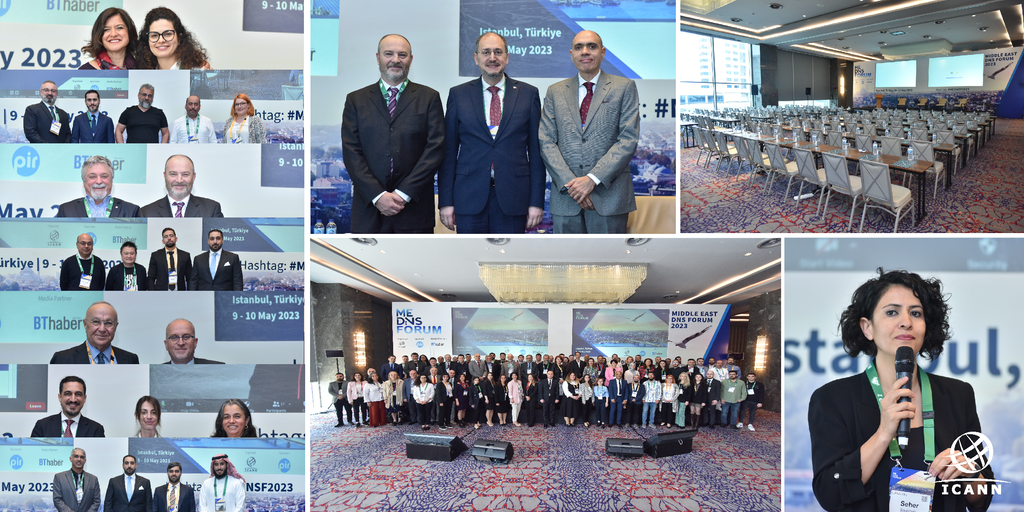For almost two years, while the world was entirely or partially locked down because of the pandemic, the Internet emerged as a lifeline that helped more than five billion people and millions of institutions and businesses around the world continue to live and operate almost normally. Indeed, one of the few positive outcomes of the pandemic is the increased pace of digital transformation in the various sectors, albeit to varying degrees among the different regions of the world. The Middle East is no exception as governments, businesses, and individuals are increasingly embracing technology to become more efficient, enhance service offerings, and unlock new opportunities for development.
Against the backdrop of this unprecedented digitalization in the region, Istanbul hosted the ninth edition of the Middle East Domain Name System (DNS) Forum after two years of convening virtually, from 9-10 May 2023. The forum is an annual event that gathers domain name industry stakeholders to discuss regional issues of interest, and exchange views and experiences among participants from within and outside the area. The overall objective is to enhance the maturity and robustness of the DNS ecosystem at the regional level.
Over the course of the two-day event, the discussions revolved mostly around domain names, yet, also, in the larger context of realizing the potential of an Internet that is unified, secure, and inclusive. In his keynote speech, John Crain, Internet Corporation for Assigned Names and Numbers' (ICANN's) Senior Vice President and Chief Technology Officer, provided an overview of the 40-year history of the DNS, and illustrated how remarkably adaptable is the DNS. It has evolved over time both in terms of scalability and functionality. It has become more secure by deploying DNS Security Extensions (DNSSEC), among other technologies. It also has evolved to offer far more usability options – especially for those who would like to use the Internet in their native languages and scripts. At the same time, it remains one of the few services that has been running non-stop for almost 40 years.
More technical talks at the forum delved into DNS security aspects, where participants from technology and service providers shared their experiences in enabling DNSSEC and adopting DNS security norms and best practices to ensure the security and stability of their DNS infrastructures. Additionally, ICANN presented on its multifaceted approach to mitigating DNS abuse and shared some recent data and analysis of domain abuse across top-level domains.
A panel discussion on Internet fragmentation underlined the crucial role played by the Internet protocols in holding the Internet together as one, global, unified network. The panelists agreed that the Internet still functions as one interoperable system and noted that fragmentation could happen if we begin to see different network standards and protocols introduced that are not able to interact and communicate together. The key takeaway from this discussion is that Internet fragmentation is a real threat, and whether it is driven by geopolitical competition between major economic powers, or other business interests. Therefore, it behooves everyone involved in Internet governance to articulate the value of the Internet and to be conscious of the impact that regional and national regulations may have on its unity and interoperability.
Other panels brought interesting perspectives from country code top-level domain (ccTLD) operators and registrars from the Republic of Türkiye, Saudi Arabia, United Arab Emirates, and Bahrain. The discussions highlighted local market trends and success stories relating to how ccTLDs' prudent policies, combined with business innovation, can yield significant gains in the digital economy. Moreover, important topics such as Internationalized Domain Names (IDNs), Universal Acceptance (UA) of domain names and email addresses, as well as the next round of new generic top-level domains were discussed. The sessions discussed various issues, from progress made in different aspects of technology and policies, to challenges in implementation of IDNs and UA. Yet the common thread in the discussions was how developments in the domain name space could bring opportunities not only to those who are currently connected, but also those who are yet to come online.
More than 200 participants attended the forum, almost half in person and the other half remotely. This is the first time the forum has been organized as a hybrid event where remote participants, both speakers and attendees, would have a similar experience to those who are physically in the room. The active participation of more than 100 remote participants is a testament to the robustness and effectiveness of ICANN's remote engagement tools.
If you missed any sessions, you can find recordings and transcripts available here.
Feedback is an important tool to help us continually improve, and I would invite those who attended the forum this year to take a few minutes to complete this survey.
It is worth noting that this year we celebrated the tenth anniversary of ICANN's Istanbul office. There is no better way to commemorate this milestone than with our community and participants of this year's forum. I am very grateful for everyone who contributed to the success of the event this year, especially the speakers and participants. Thank you!



